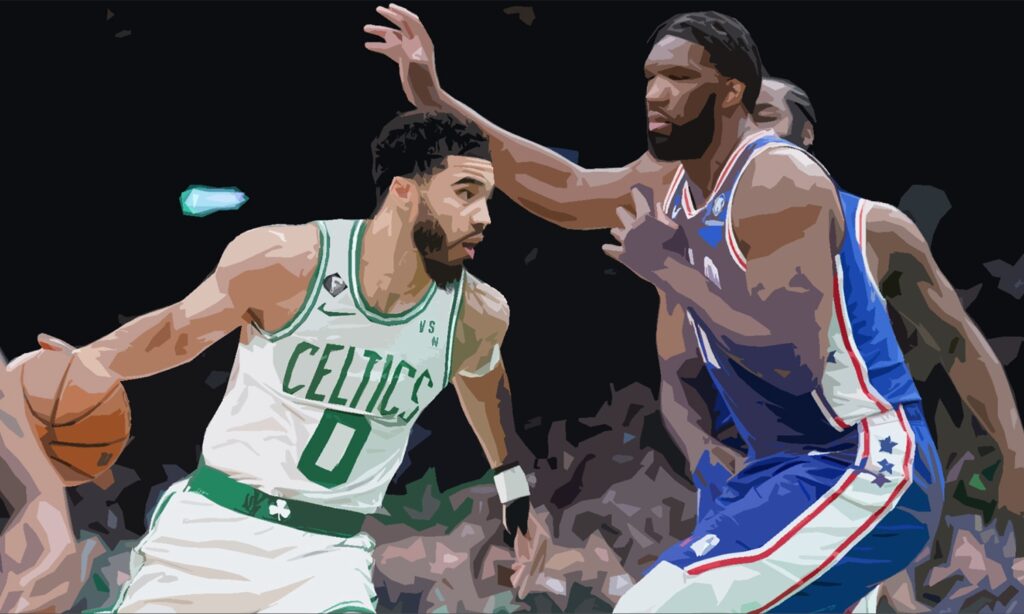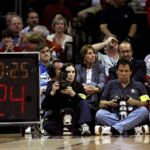Whether you are attending a game or watching it on TV, know that every basketball league, has a targeted finish time they’d like to uphold.
Although NBA quarters are fixed in length, the game is played with stop time along with a scheduled halftime between quarters 2 and 3.
And occasionally, overtime may be required to settle tie games.
So, there will always be a discrepancy between clock time and game length in real time.
How long does a Basketball Game last?
The time duration of an NBA basketball game is 48 minutes, or four quarters of 12 minutes. If the score is tied after four quarters, the game will extend to 5-minute overtime periods. The team ahead at the end of overtime will earn the victory.
Approximately 6% of all NBA games reach overtime. That is about 76-78 games from a total of 1,230 regular season games or 82 games per team.
Most of those matches are settled within the first period of overtime.
The team with the most total points at the end of the 5-minute overtime is declared the winner.
Should the score remain tied after the first overtime, the game moves onto the next overtime period – so on and so forth.
How long do Basketball Games last in real time?
The average NBA game length typically lasts 2 hours and 20 minutes in real time.
A considerable number of games will finish within +/- 10 minutes of this projection.
Some games may last longer (or shorter) depending on various circumstances I address below.
Keep in mind that there is a 15-minute halftime following the second quarter.
Players also take a short break at the end of quarters 1 and 3. Each break is 2:10 minutes in length.
You’ll also have stoppages, timeouts and scheduled commercial breaks during gameplay.
Play stoppages are the result of dead ball situations such as free throws, turnovers, fouls, substitutions, out-of-bounds and play reviews.
These types of stoppages take place in every game.
Typically, the more game stops, the longer the duration of the match.
NBA TV Commercial Quotas
As a note, the NBA has an agreement in place with the TV networks to cut to commercial breaks. There must be at least two TV timeouts during each quarter.
The first two TV timeouts of each quarter last for 2:45 minutes for locally televised games and 3:15 minutes for those that are nationally televised.
Additional commercial breaks during play are 1:15 minutes long.
Furthermore, the league also integrates commercial breaks during half-time, which makes up the remaining of their advertisement quota.
Overtime in NBA Playoffs
Just as in the regular season, tie games in the playoffs lead to 5-minute overtime periods.
If the match is still not settled within the first overtime, another 5-minute overtime period will be played and so on.
The whole ordeal will extend the game by another 15 minutes per overtime period, in real time.
Unexpected Delays
In the regular season, as in the playoffs, there is the possibility of unexpected delays that can cause the game to last beyond the 2.5-hour benchmark.
The delays can be a result of player injury, review of plays, damaged backboard or support structure, electricity blackout and so on.
Were NBA Matches always 48 minutes long?
When basketball was first invented, the game adopted two halves of 15-minutes.
The sense was that the duration of NBA games were not long enough to deliver a competitive and high scoring product.
So, the rules were changed in 1905, in which the halves were adjusted to 20-minutes each.
In 1951, the game was split into four 10-minute quarters. But that would stay short-lived.
Three years later in 1954, the NBA adopted the 4x12-minute quarters and have kept it since.
If a Basketball Game starts at _pm, what time will it end?
| Start Time | End Time (+/ 10min) |
|---|---|
| 12:00pm | 2:20pm |
| 1:00pm | 3:20pm |
| 1:30pm | 3:50pm |
| 3:30pm | 5:50pm |
| 5:00pm | 7:20pm |
| 6:00pm | 8:20pm |
| 7:00pm | 9:20pm |
| 7:30pm | 9:50pm |
| 8:00pm | 10:20pm |
Game Lengths - FIBA and NCAA
The game formats for both international and college basketball have clear differences when compared to the NBA.
While FIBA does incorporate the four-quarter system, their quarters are only 10-minutes each in length.
Meanwhile, the NCAA college basketball games are made up of two 20-minute halves.
In the table below, I compare all three professional leagues and include their approximate game lengths in real time
Game Lengths for Televised Basketball Leagues
| League Name | Game Clock | Format | Real Time Length |
|---|---|---|---|
| National Basketball Association (NBA) | 48 minutes | 4x Quarters (12-min) | 2 hours 20 min |
| Federation Internationale de Basketball Amateur (FIBA) | 40 minutes | 4x Quarters (10-min) | 2 hours |
| National Collegiate Athletic Association (NCAA) | 40 minutes | 2x Halves (20-min) | 2 hours |
Final Thoughts
The amount of time you need to reserve for a basketball match depends on whether you plan to attend the event or watch it on television.
If you plan to attend in person, consider the commute from your current location (i.e. home, work) to the venue.
There is typically a bottleneck at the venue entrance, where everyone gets their tickets scanned.
The walk from the entrance to your seat can add another 5 minutes.
Did you consider refreshments along the way? You might be hungry since the game falls right around dinner time.
But don’t stress if you arrive past the marked time on the tickets.
First off, the doors are open well beyond the first quarter.
Moreover, tip-off starts a little past the ticket time.
The delay is about 7-10 minutes long to allow for the pregame and team introductions, along with the anthem.
And as we’ve already discussed, the average length of an NBA game, including breaks, is 2 hours and 20 minutes (+/- 10 minutes).
Just note that the length of basketball games is designed to keep the fan base engaged.
And we're not just talking for the adults, but the children as well.
There must always be a balance between hosting games after working hours, which also end at a reasonable hour.
The overtime period is a short extension in case teams cannot settle the score in regulation.
Regardless, the game is fast-paced and tight games enhance the level of entertainment.
It's no wonder the NBA is amongst the leagues that pay the most.






